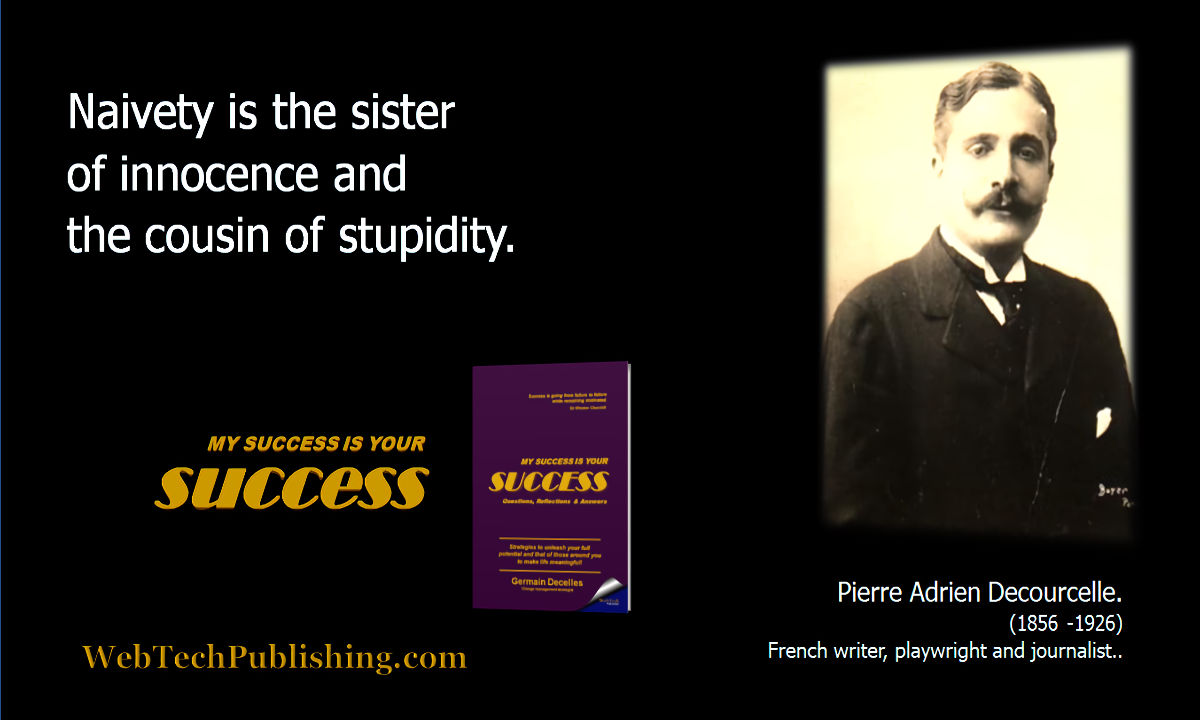|
Article published on LinkedIn.com: May 5 2023
10_NAIVETY_030523_en.pdf

The quotations, short texts, and photographs in this
work remain the exclusive property of their respective
authors.
NAIVETY
Naivety is not a static concept. What may seem
like naivety to some people may seem like kindness to others,
or among other things, optimism, good faith, and innocence.
But maybe you feel as if you have a tendency to be
naive in life and you fear that it will cause you problems?
You don't want to become distrustful or pessimistic,
but you can't carry on as you are, because it hurts you.
·
Maybe you are naive
about relationships in the blind belief that they will
magically work out or do you fall in love in the blink of an
eye?
·
Maybe you find it
hard to read others and always think the best of them no
matter what.
·
Maybe you tend to
think that things in life are just sunshine and rainbows, when
the world, unfortunately, doesn't quite work that way.
·
Maybe you have even
been scammed in the past.
Either way, your naivety has gotten you in trouble,
and you want to become a little more knowledgeable and more
informed in the face of adversity in the world, without losing
that wonderful optimism and innocence you have now.
Here are some tips to help you say goodbye to
gullibility and educate yourself a little more, without
disillusioning you.
1.
Think before you speak or act:
if you think you're naive,
your problem may be that you don't stop to think before you
speak or act.
You say the first thing that
comes to mind or follow your instinctive reaction without
taking a moment to really think about the situation.
So, the first thing to do is
to consciously slow things down and take some time to think
before you say or do anything.
It's easier said than done
so start with a day. A day when we make it our duty to take a
moment to reflect and look at the issue from another point of
view before reacting to any situation.
Then
a week. If you keep forcing yourself to take that time and
think first, sooner or later, that will become your default
reaction.
2.
Don't be afraid to sit on the fence:
the fence is underrated. In
our modern world, you're often expected to choose sides from
the start, and if you sit on the fence, you're seen as weak or
indecisive.
3.
Be overly cautious:
if you tend to be naive,
then to solve a particular problem, you will have to
deliberately behave too cautiously.
4.
Be more present:
naivety can often result from having your head in
the clouds and not really paying attention to what is
happening here and now. So, make sure you try to be more
present in your day-to-day life.
5.
Listen attentively:
being a good
listener is a trait to develop, but it can also be a great way
to learn about a new person without revealing too much about
yourself.
Ask them questions and show them genuine interest, rather than wanting to
share details about your life right away.
6.
Do research:
well-informed and conscious
people can, of course, remain naive.
But their knowledge of the
world makes them less likely to take things at face value. So,
try to educate yourself on the things you don't understand.
·
If you're
financially naive, read up on what you need to know or even
consider taking a course.
·
If you have
been the victim of a scam, always make sure to confirm things
directly with the company or institution involved before
acting. For example, if you have received a pseudo-email from
your bank that you are suspicious of.
·
If your
problem is being naive in your relationships, examine the
psychology behind why people act a certain way.
·
Whenever you
are unsure of something, go and research before making a
decision. Life is a long lesson, and the more you learn, the
more realistic and practical you will become.
7.
Keep Trusting Others:
whatever you
do, don't start blaming yourself for having a confident
nature. Trust is a beautiful thing.
To be less naive is not to distrust people. It's about not making
decisions quickly. It is a question of thinking well and
reading situations between the lines.
That doesn't mean you can't trust the people around you and keep looking
for the good in them. Assuming someone is trustworthy, until
proven otherwise should always be your default reaction, and
that doesn't mean you're naive.
Of course, there are many people in the world who are bad, but the vast
majority of human beings are essentially good.
8.
Learn to recognize when someone is being dishonest:
if you often get tricked by liars, learn to spot the most common signs of
being lied to.
Most human beings are naturally confident until something happens to
change that. As a general rule, and especially if we are
honest with ourselves, it is in our nature to believe what
others tell us, especially our loved ones.
The most cynical would say that's gullible, but there's nothing wrong
with trust being your default setting.
Although we should trust people, and most people are inherently
trustworthy, we will all encounter a serial liar at some point
in our lives.
Being able to spot one can save you from serious disappointment whether
in a personal situation or in a work environment.
We all tell white lies every day, whether for practical reasons or
because no one really needs to know.
It can even be about making the other person, feel better about
themselves, although this has been proven to be more of a
feminine trait, whereas men are more likely to lie to feel
better.
While it's a good policy to try to be honest as often as possible, being
completely honest can sometimes end up hurting people's
feelings or causing problems.
However, it's when bigger lies start in an important relationship,
whether it's with a partner, close friend, or family member,
that things can start to fall apart quite quickly.
Lies can also be a big problem in business situations and professional
environments.
We're normally pretty good at naturally spotting the signs of lying, but
we put those instincts aside and convince ourselves we've been
wrong.
If you're worried that someone is trying to cheat on you, here are some
signs you can watch for that will confirm they're not being
honest with you:
a.
They begin to fidget:
when we lie,
we get nervous, no matter how many times a day we do it.
Nervous energy can be detected when someone plays with their hair,
fidgets with their feet, taps their fingers on the table, or
suddenly moves in their chair. This is because he
subconsciously prepares to run away in case their lies are
discovered.
b.
They repeat themselves:
a great
way to tell if someone is telling lies is for the liar to
repeat what they've already said while adding a lot more
detail than you asked for. In his desperation to prove to you
that he is telling the truth, he will go too far.
A good test is to stay quiet longer than usual to see if he keeps
talking. Thus, long silences will make it uncomfortable.
Your silence will make them think you don't believe them, so they'll try
harder to convince you.
Repeating what he has already said is a sign that he is trying to fill
the time while he is trying to update his lie in his head or
just embellish his story further.
c.
They are incoherent:
all that
chatter they do. If they keep changing details about their
story, that's your clue.
Granted, none of us has incredible memories, but if there are glaring
inconsistencies in their story and it keeps changing and
evolving, then you can be sure they're not being honest with
you.
d.
They cover vulnerable parts of the body:
as you probably know, lying can make you feel exposed and
vulnerable.
The feeling that you might be attacked may cause you to cover your head,
neck, or abdomen to protect yourself. You might also see them
covering their mouths, ashamed of their words and trying to
cut off communication.
e.
Body language and words don't match:
he's telling you a sad story, yet he's smiling and cheerful,
so you'll notice their body language is on high alert. Your
alarm bells should ring immediately!
It is very easy to lie with words, but only the liar will be able to
remain aware of their body language as they can emit signals
that correspond to their lying.
f.
Breathing changes: when we lie, our body reacts. Our heart
rate and blood flow change, which means we breathe more
heavily.
Obviously, if your interlocutor has just walked up a flight of stairs,
that's not an indicator you can rely on, but if he's sitting
on the couch or behind his desk and his breathing changes, you
have reason to suspect him.
g. They
do not make eye contact: some people are terrible with eye
contact, but if someone who is usually happy to look you
straight in the eye suddenly avoids your gaze, they may be
lying between their teeth.
On the other hand, if he's making too much eye contact or more eye
contact than he normally would, it could be a deliberate and
quite aggressive attempt to convince you that he's being
completely honest with you.
h. They
are looking for an escape: there is more to their eyes
than just whether or not they are looking directly at you.
For example, people's eyes will look in a certain direction when they
lie, but unfortunately it can be up and right, or down and
right.
You need to know their typical eye pattern before you can identify the
situation. So, you'll probably only notice it in people you
know well.
Normally it doesn't matter what they are looking at, except if they are
looking at the door it is a sign that, even if they are
unaware of it, they are checking their escape route if they
need to.
No one in their right mind really likes to lie or feels comfortable doing
so, so their subconscious is looking for the fastest way out
of the conversation.
i.
They are getting ready to flee: it's not just their eyes
that will give you a clue. Their whole body will likely be
tilted towards the door, and if they're standing, you might
notice them slowly and gradually moving towards it.
If they were relaxed when you started talking to them and become tense
when a certain topic is brought up, or if they tense up as
soon as they see you, this is also a sign that they
subconsciously prefer really to be somewhere else, and their
bodies are about to flee.
j.
They have an aggressive behavior: if someone is getting
angry or confronting you, that's a sign to take note of.
If someone starts behaving aggressively without provocation, their
unconscious defense mechanisms are kicking in.
Always remember to look at the big picture.
Not all these signs will be true for everyone you meet depending on the
circumstances.
If it's someone close to you, use what you know about their normal
character before deciding whether you think they're lying or
not.
If it's someone you're not that close to, be sure to consider the
context.
For example, psychopaths don't get nervous when they lie because they
won't show that they really feel guilty for the lies they
tell.
Ultimately, just as you instinctively act in certain ways when lying, you
are also able to instinctively pick up on signs in others.
Listen to your intuition and you can rarely go wrong.
9.
Listen to your instincts:
even if
you tend to be naive, gullible, or innocent, there's probably
often a feeling deep inside that tells you something's wrong.
Rather than just putting it aside, it's important for you to check out
that feeling and think about where it is coming from.
Don't be afraid to let your instincts guide you from time to time. It
might not always be right, but it's there for a reason.
10.
Be open to
meeting new people:
your naivety may be due to the fact that you have led a
rather sheltered life, surrounded by many people who think
exactly the same way as you.
If this is your case, you should be open to making
friends with people from different backgrounds or cultures.
If you don't live in a very diverse community, it may
be more difficult, but the internet can be a great way to
mingle with people, different from you.
And if you live in a multicultural place with
people from all sorts of socio-economic backgrounds and with
different beliefs, then take advantage of that and be open to
making friends with those who don't look like you, don't speak
or don't think like you.
11.
Go ahead and
find out about life:
naivety is often a trait
of people who lack life experience. If you don't experience
the world firsthand, it's inevitable that you'll be a little
gullible or innocent.
Normally people become less naive with age, but you can help
yourself by simply saying, yes to life.
Try new
things, volunteer to help those less fortunate than you, and
learn about new cultures.
Learn about the history and realities and
injustices of the society you live in, look at things from the
perspective of others, and embrace all things in life whether
good or bad, so that you can have a perspective on life.
Here we all need to remember Pierre Adrien
Decourcelle comment, « Naivety is the sister of innocence and
the cousin of stupidity. »
Find out more about «
Discovering yourself as to better understand others
» with My Success Is Your Success. The
book through questions, quotes and reflections provides the
necessary elements to explore all about motivation so to shape
your success and help those around you do the same. Remember
that success is all about team efforts!
|

|
This book is the result of forty years
of experience acquired with local and international
organizations and companies and during consultancy,
change management, transition and marketing services.
This 404-page
personal development book was published by WebTech
Publishing and is available online in English, North
American French and European versions. For more
information and to view the flip book, visit
webtechPublishing.
|
About the Author
Decelles
Other publications:
ISO Pour Tous
– Le manuel
d’information ISO – Le guide de préparation ISO – La
gestion du changement en affaires – La gestion de
projet d’affaires – Le
changement POUR TOUS –
Change your future,
now! – Mon succès est votre succès.
Press Contact
Germain Decelles, o.s.j.
WebTech Management et Publication Incorpored
|
 |
—30 —
|